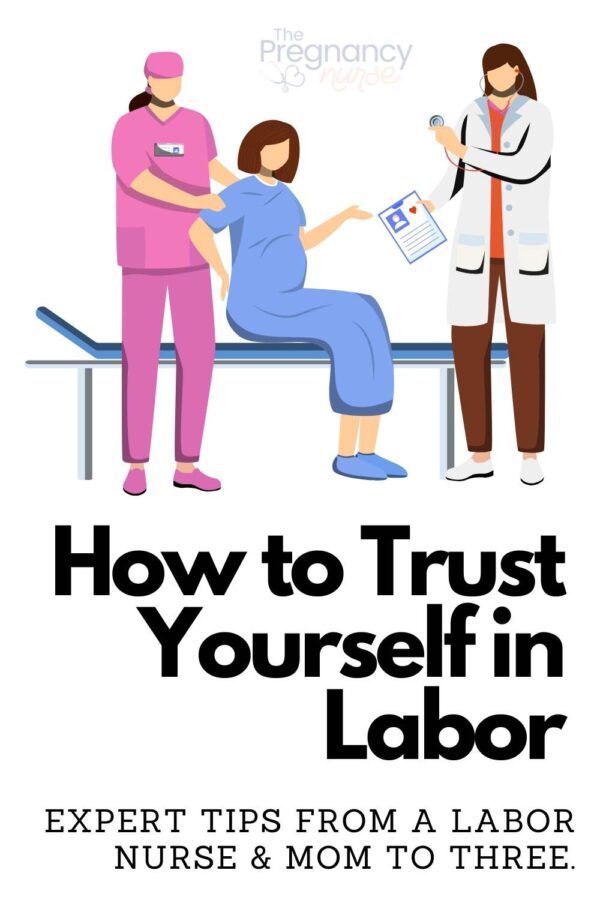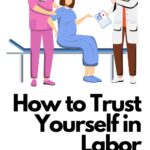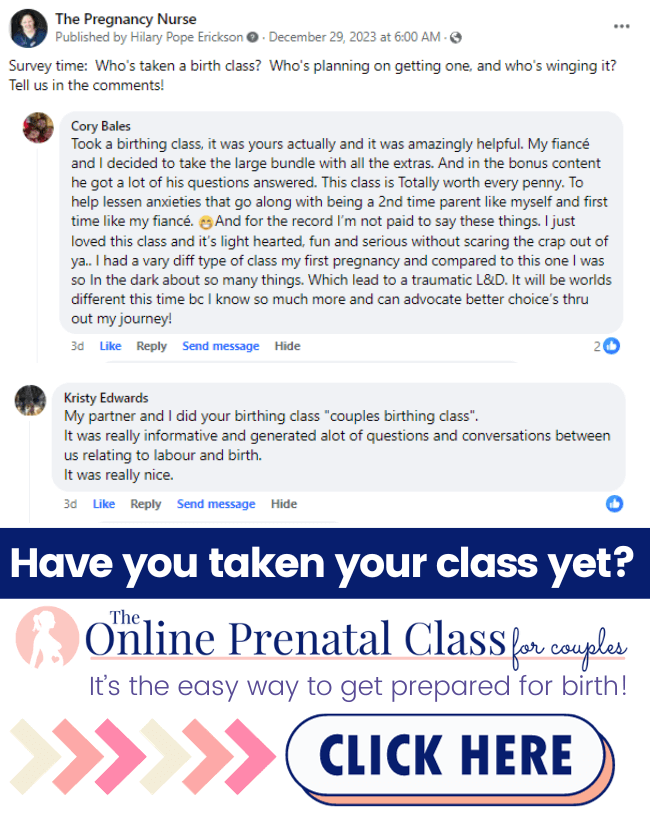📣 YOU are clearly getting prepared for pregnancy, birth & beyond — but do you wish your partner was more involved (looking for a teammate rather than just a cheerleader)? Couples love THIS! 💛🧡💚
Are you worried about making all the choices that will confront you during labor? Honestly, I can’t blame you. The hospital is a foreign place with lots of choices that will come-up during your stay. While many patients just take whatever their doctor says and use that, I’m hopeful that you want to be more in control of your future — and that’s where these tips will be helpful.

Before we start, I want to explain something really important:
Data gives us wide swaths of information across a full population (at least good ones do).
However, you really need experts to apply it to YOUR situation with a lot of experience — and that’s where your doctor comes in. Like I always say in my disclosure:
This (or any article on The Pregnancy Nurse) should be taken as medical advice, this purely educational. Please talk with your provider about your specific needs and circumstances.
The hope is to take the data, apply your current and past medical situations and make a plan together moving forward. But, how do you do that? I’ve got tips!
A Foundation of Information
Ok, the first thing you need to know is just a foundation of how birth happens, what to expect in the hospital and how to get the most out of your stay.
Now, I know you’re thinking — where do I get that, because my birth class just covered pain management?
And that’s awesome — but a good birth class covers so much more…
And, as a note I think a good birth class should also engage your partner and getting them prepared as well — which is why I recommend this one.
When you’re tallying if a class is helpful, you want to watch for:
- Understanding 3rd trimester testing (because FAR too many births are going off the rails at this point)
- How to labor at home in early labor (safely)
- What to expect from admission at the hospital (this part already leaves far too many families freaked out)
- Common interventions & supplies (these can be really scary if you don’t know how routine they are in L&D)
- Pain management options including natural pain management techniques (you deserve to know your options in advance)
- What to expect at an induction (even if you’re not planning on one, you just never know)
- What happens at a cesarean birth (again, even if you’re not planning on one)
- What happens at delivery
- How to manage your postpartum stay (and get the most out of it)
- What to expect when you get home, how to stay safe and even thrive as a new parent!
Now, you’re thinking — “This is a full college class, Hilary” — and I’m here to tell you that you’re really getting surface information. You don’t need to know the chemical make-up of oxytocin, but you do want to know how it affects your birth and how to promote it.
I think a good birth class can be done in just a few hours.
I think it’s also smart to make sure you “vibe” with the teacher. The class I recommend actually has a secret free chapter right here that gets you understanding 3rd trimester testing.
Do a vibe check. Like what you see — jump in and get it done!
Want to know more about birth education — check out these posts:
- Do Birth Classes Improve Birth Outcomes? What do the studies show?
- Do You Need a Birth Class if You Plan to Get an Epidural
- Alternatives to Hospital Birth Classes
- How Much Do Birth Classes Cost?
- Are Childbirth Classes Covered by Health Insurance?
Remember What Your Job Is
Ok, here is where I remind you that your job is to give that baby a safe, happy place to grow and thrive in your womb.
It’s not your job to understand fetal monitoring.
It’s not your job to read all the studies about everything you’ll confront at birth.
That’s why you’re hiring an expert.
For instance, I know nothing about tree trimming, but we have a few really close to our house and we get wild winds here in Phoenix. So — I hire an expert to trim it right and keep our home safe. I just know to call him before monsoon season hits.
You really need to look at your doctor as nothing different. They’re just an expert in the room that does know all those things and you call them in when you need help.
They are not, under almost ALL circumstances, making choices for you.
Somehow doctors decided that since they sometimes (and I mean RARELY) make life-saving choices in situations they get to make all the choices. Honestly, I think most of those doctors are retiring, but they are still out there.
Sometimes you’ll hear them say dumb things like :
- We’ll schedule your induction at 37 weeks (vs — let’s consider an induction at 37 weeks)
- We’ll section at 8 if I don’t see progress (vs, I’m concerned about how baby’s descending, let’s review it at 8)
- We’re going to break your water (vs, what do you think about me breaking your water?)
Honestly, not sure who the “royal we” is in this situation, but I’m not a fan. And you don’t have to be a fan either (and feel free to correct them — nicely, that’s honestly the only way they will learn).
So, to boil this section down:
- It’s your job to get a foundation of knowledge (like we talked about above)
- It’s your job to ultimately make the choices
Oh, I also think it’s smart to think about what you’d like in a perfect world with a lot of these things — building a birth plan can do that. I can also help with that right here:
This doesn’t mean things go according to that “plan”…. and you’ll still have to make choices the day of. So let’s keep talking!

Informed Consent Isn’t EVERYTHING
Before “big” choices your provider should provide informed consent.
And honestly, even before smaller ones, they should at least provide some balanced info that should include:
- Risks — things that could go wrong with their recommendation (they often forget this part)
- Benefits — why they are recommending it
- Alternatives — what else could we do (often, this is to wait)
The thing is, this should be very medically-minded. For an induction it might look like:
I think we should perhaps induce you. The baby seems to not have enough fluid around her and that can be a problem as they stay in the womb including possibly stillbirth from the cord getting squished. You’ve said that fetal movement seems less lately and that has me concerned. However, there is a risk to an induction of labor including increased pain, longer being in the hospital and possibly postpartum hemorrhage. We could also wait if you would prefer. I could order an ultrasound in a couple of days to check again. Either way, I want to be sure that you’re doing your kick counts.
Now, that is a very simple statement. But what’s important to you?
They said you might be in the hospital longer, but some people think that means a few extra hours, when it really could be a few extra days.
Keeping in mind that while your provider has a guess they don’t really know how long your induction will take (please let me know if you find a good crystal ball out there).
So — how do you find out what’s important to you? You ask questions.
If my provider gave me that informed consent, I’d ask:
- I was hoping to avoid an epidural — do you think this increases the chance I’ll need one?
- I hate being in the hospital, how long would you guess I’ll be there? What should I prepare for?
- How low is that fluid number, how concerned are you about that? How often do they measure wrong, could we get an NST to see how baby is looking?
As you can see in those questions I asked, I use my foundation of info to know about 3rd trimester testing, I knew that I preferred not to have an epidural in my perfect birth “birth plan”, and I also knew enough about inductions to know that sometimes they’re pretty long — I’d done my part to get to this point.
I think far too many people get that informed consent and then feel like it’s a multiple choice test where they then have to choose option A or option B.
When in reality this an essay test, and you should now ask questions to get more information.
You also don’t have to make a choice right then.
You could ask the doctor to see their next patient while you discuss it with those you love (even making a phone call is fine), or even go home to make the choice in a few hours as you sit on it (again — making sure your provider doesn’t see any big issues with a few hours wait – this low fluid scenario could be mild, or really problematic).
So, keep asking questions until you get clear on:
- What your risks are
- What is going to happen moving forward
- Any complications you need to keep an eye on
Bytheway, far too many people go in for an induction and just don’t ask the questions to get the full picture of what the plan is. I made an induction checklist to do just that:
Changing Minds & Hearts
Here’s the one. The one my husband hates.
You can always change your mind.
Ok, not always. Once they start a cesarean you can’t really walk that back, and once they break your water it’s broken — but in MOST cases you can say, this isn’t working for me I want to stop.
That may mean taking a breather to talk about things a bit more.
It may mean going home.
BTW, going home is one of my favorite keys that people just don’t talk about enough.
But you can change your mind.
Once again — I think far too many patients get stuck on “I made this choice” and forget that they can change their mind once they really see what they’re facing. Often providers don’t bring it up — but it is an option.
Now, is it always a safe option? I don’t know. That’s up to you to decide with your expert team. The good news is once you’re admitted to the hospital you also have a labor nurse you can include in this conversation.
As a note, it is NOT your nurse’s job to give you informed consent, that is you doctor or midwife’s job. BUT they can educate you, talk over options and help you navigate the “system” — be sure to use them!
Ok, it’s honestly a lot more simple then this article made it seem:
- Get that foundation on information. I recommend this.
- Remember, your job isn’t to be the expert, but it is to make the choices (with their expert advice)
- Once you get informed consent, be sure to ask questions about what’s important to you (because it’s different for everyone)
- Remember you can most often change your mind — very few choices are final.
That last one always gives me a lot of comfort as a human.
Honestly, I think you’re going to do so great because you’re getting prepared already. I’m so glad you’re here. Please subscribe so we can continue to hang out for the rest of your pregnancy!
Also, check out my YouTube vide for more on this topic:






 What To Do If Labor Isn’t Progressing?
What To Do If Labor Isn’t Progressing?
